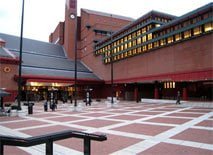British Library (BL) staff are still waiting for
the outcome of their 2007 pay deal which is now over six months late. Funding
was in place in August for a 1 year deal but management (without consulting the
unions) decided to delay all pay talks until the outcome of the government’s
Comprehensive Spending Review (CSR). The BL’s remit in the CSR is still unknown
and management have cancelled all scheduled pay meetings with the unions,
refusing to begin negotiations until the remit has been agreed with the Department
for Culture, Media and Sport and Treasury. The unions asked for a meeting with
management in order to express staff concerns at the continuing delay and were
told that such a meeting "is not justified."
Not content with refusing to negotiate a pay deal that was due in August 2007,
BL management has also sought to suppress any discussion of industrial action
in the workplace. Prior to a recent PCS British Library North trade union branch
meeting on pay, the branch Executive Committee were warned in writing by
management that any attempt to plan or implement industrial action in
"facility time" (time granted for trade union activities during
working hours) would violate the facilities agreement and put union reps in
breach of their contracts. In the current climate, with suspensions of union
reps in other areas of the public sector such as the Child Support Agency and
the Department of Health, PCS HQ has advised that the safest way to discuss
industrial action would be to hold meetings away from library premises and
outside working hours.
As a consequence, around 50-60 PCS members at the BL site in Boston Spa, West
Yorkshire, sacrificed part of their lunch break in order to gather in a lay-by
outside library premises and discuss strike action. Members voted unanimously
with a show of hands for industrial action, also demanding that a ballot occurs
before a pay offer has been placed on the table by management (whenever that
will be!). PCS members at the BL continue to demonstrate a willingness to
undertake industrial action, in spite of the hardships of low pay and rising
living costs. Anger and frustration with both BL management and government
policy in relation to public services generally, was extremely apparent at the
meeting and reflects the increasing radicalisation of workers throughout the
public sector.
Any action undertaken by BL workers would be far more effective as part of a
national campaign, orchestrated by PCS and other public sector unions. PCS
National Executive Committee (NEC) have so far chosen not to pursue a strategy
of national strike action, although there has been intermittent (and largely
ineffective) one day strikes in particular areas of the public sector that have
been hit hardest by government policies, such as the Department of Work and Pensions.
Postal workers demonstrated in 2007 that industrial action can have a national
impact if clearly thought out and pursued with inventiveness and ingenuity.
Although CWU members were later betrayed by their union leaders, PCS NEC now
has a real opportunity to respond to the mood of public sector workers and
orchestrate effective and targeted strike action at a national level.






